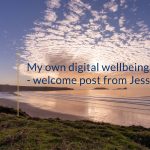Hello, my name is Jess and this is my first VoxelHub blog post. I will be exploring topics that are important to me, on a personal and professional level, while also considering my digital well-being, and what I can do to improve it.
I used to have a much more negative conception of the effect of technology on well-being and mental health. However, I have concluded that it is the neoliberal late-stage capitalist system we exist in that causes much of the problems generally ascribed to the use (or rather overuse) of technology and online spaces and not the technologies themselves.
Again, in digital well-being too, we experience blame being put on the individual for problems caused by the system. As a collective, we can work towards a healthier relationship with technology, ourselves, and each other. ‘The user is not only the consumer of the media but is also the creator’; we are not powerless and have the ability to co-create and shape our online experience into one that is more positive, as a community. (Dr. Jolanda Veldhuis, assistant professor of communication science at Vrije Universiteit Amsterdam).
We have so many choices, both online and in real life – there are now too many social media, news, and gaming platforms to keep track of. We can consume media wherever, whenever and however we want to. This means that the effect that the digital space has on well-being is increasing, whether that be positive or negative. We need to become more mindful of how we exist in the digital world and what effect it may have on us.
“Social media isn’t all bad, you just need to watch where you place your likes” – Cara Delevingne
Curating a space that is safe and affirming is important. Influencers are called influencers for a reason – they can affect what we believe and value. However, we have a choice of who we allow to influence us – just like in real life. For example, the closest to an influencer I follow would be people like blackforager (Alexis Nikole) and Manners London.
These people influence my digital well-being in a very positive way. I learn new things which I can then go out into nature to put into action and share with my peers. I have found that foraging – the online spaces and real-life walks and chats – has allowed me to connect with far more people than I expected. Watching videos and reading articles by those more knowledgeable than I am has increased my confidence and interest. A video of someone making sprite out of pine needles is far more engaging than a book with a block of text (for me anyway!).
Of course, this can go both ways, I find that certain social media personalities and online spaces can have a rather negative effect on my well-being and own self-image. It may sound too simple, but unfollowing a page that doesn’t make you feel good is a great way to start improving your online space.
As I continue to learn more about digital well-being, I invite you to learn with me and ask questions.
What are the assumptions we make about ourselves and technology?
How can we improve our well-being in tangible ways?
How can we use technology with intention?
When Sylwia first asked me to write blogs for Voxelhub I was a little hesitant. I doubted my abilities and especially my knowledge of digital well-being. I have come to realise that the most meaningful work I can produce must come from an authentic place. This does not mean I have to be an expert but simply that I must be honest and use my own voice as I keep learning and navigating digital spaces.
Thanks for reading! I hope that some of you may join me as I venture on this journey and share my explorations and findings on the Voxel Hub blog.
If you find this article useful, please share it with others who may benefit from it.
Photo by Marcus Woodbridge on Unsplash

